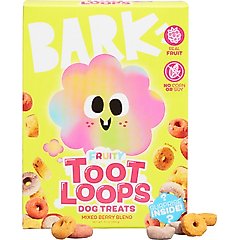Can Dogs Eat Lemons?

Photo by Chewy
Your pup can enjoy a lot of human foods, but can dogs eat lemon? And is lemon good for dogs? Lemon does contain some vitamin C and antioxidants, but this tart and citrusy fruit isn’t safe for your furry companion.
Lemons are high in citric acid, which can cause stomach upset, vomiting, and diarrhea. The peels also contain toxic essential oils that can lead to serious health issues. While your dog is unlikely to overdo it on lemon—the sour taste is enough to keep most of them away!—it’s still important to keep these citrus fruits out of your pup’s bowl.
Here’s everything you need to know about dogs and lemons.
Before introducing any new food into your dog’s diet, always check with your veterinarian.
Why Are Lemons Bad for Dogs?
So, dogs shouldn’t eat lemon, but is lemon bad for dogs? Consuming small amounts of lemon likely won’t cause issues in your dog, but large amounts can be harmful or even toxic, says Jason Horgan, DVM, medical director of LeadER Animal Specialty Hospital in South Florida.
Here are some of the reasons lemons are bad for dogs:
- They’re high in citric acid. Citric acid gives lemons the sour taste that makes your lemonade great, but it can be harmful for your pup. Citric acid can cause mouth and throat irritation, GI distress, and stomach upset (which presents as drooling, diarrhea, and/or vomiting).
- They contain toxic essential oils. The peels and pith (the white part between the rind and flesh) contain high amounts of limonene and linalool—two essential oils that are toxic to dogs. If consumed in large amounts, these essential oils can cause liver disease and, ultimately, liver failure.
- They contain other toxic compounds. The peel also contains compounds called psoralens, which can cause sensitivity to sunlight (phototoxicity). This can lead to eye and skin issues in your pup.
- The rind can be a choking hazard. Lemon rinds are tough and difficult to digest. If your dog swallows a large piece, it can present a choking hazard or become a bowel obstruction, according to Amy Farcas, DVM, MS, DACVIM, a board-certified veterinary nutritionist in San Carlos, California.
My Dog Ate Lemon—What Do I Do?
If your dog ate lemon, don’t panic! There are some steps you can take to determine whether this is an emergency.
Don’t Induce Vomiting
While your first thought may be to induce vomiting to get the lemon up, don’t! While your vet or emergency clinic may recommend this, it should only be done under professional supervision.
Determine Which Parts of the Lemon They Ate
Did your dog eat just the fleshy part of the lemon, or did they also get some of the rind and the pith?
A small amount of lemon flesh is unlikely to cause harm, but the peel contains higher concentrations of essential oils, which can be toxic to your pup. It can also present a choking hazard or lead to an intestinal blockage.
If you discover that your dog has eaten a significant amount of lemon rind, call your vet or the Pet Poison Helpline (855-764-7661; fees apply) just to be safe.
Assess How Much Lemon They Ate
If your dog only ate lemon flesh, the next step is to figure out how much they ate.
Dr. Horgan says small amounts likely won’t be an issue, but larger amounts can lead to symptoms. The amount of lemon that can cause symptoms depends on the size of your dog.
Call Your Vet
Symptoms are dependent on the parts of the lemon your dog eats, and how much they were able to get down.
If your dog eats a small amount of lemon flesh, you may notice digestive symptoms like vomiting, diarrhea, and/or drooling. Dr. Farcas says they might also start licking their lips or swallowing a lot, which can be a sign of nausea.
If they eat a large amount or ingest the rind or seeds, it can lead to:
- Vomiting
- Diarrhea
- Drooling
- Hypothermia
- Tremors
- Muscle weakness
- Difficulty walking
Plus, eating lemon peels can also cause an intestinal obstruction, another life-threatening emergency. And eating a large amount of peel and pith can lead to liver disease and possible liver failure.
Call your vet if you notice any of the above. Lemon poisoning can cause liver damage if not treated right away.
If symptoms are severe, bring your pup to the emergency clinic ASAP.
Can Dogs Eat Other Citrus Fruits?
All citrus fruits are relatively high in citric acid—that’s where they get their name!—which can irritate your dog’s mouth and stomach. However, some, like lemons, are higher than others, which is why they have a notably sour taste.
Generally, you should avoid giving your dog lemons and the following citrus fruits:
Other citrus fruits that are naturally lower in citric acid are OK in moderation, but they shouldn’t be a regular part of your dog’s diet. These include:
- Oranges
- Tangerines
- Clementines
If you want to give your dog fruit as a regular treat, there are plenty of other safe fruits that are lower in citric acid and less likely to upset your pup’s tummy.
Recommended Products
FAQs About Dogs and Lemons
Q: Can dogs have lemon juice?
A: No, dogs should not have lemon juice. Lemon juice is an even more concentrated source of citric acid and can really bother your dog’s mouth and digestive system.
Q: Can dogs have lemon water?
A: No, dogs shouldn’t have lemon water. While the lemon is diluted, it’s still not a great choice. Give your dog plain water instead.
Q: Are lemon trees toxic to dogs?
A: Yes, lemon trees are toxic to dogs. The leaves contain the essential oils limonene and linalool.
Q: What happens if a dog licks a lemon?
A: Dr. Horgan says it’s unlikely anything major will happen. They might pucker and make a sour face, but they should be OK if it’s just a quick lick. If you’re concerned, call the Pet Poison Helpline or your vet for advice on what to do next.
Attributions
This content was medically reviewed by Jo Cornett, DVM, Chewy veterinarian.





